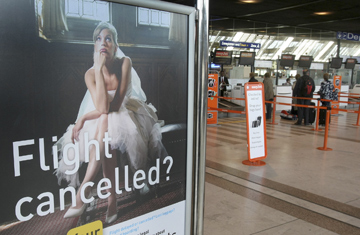
A advertising board at the empty Nice airport in southern France on Tuesday, Oct. 12, 2010
French President Nicolas Sarkozy has made clear his intention to push pension reform into law. In France, that can mean only one thing: strikes. On Tuesday, the country hunkered down for its fourth day of work stoppages this month. But in contrast to the earlier protests, the Oct. 12 walkouts, led by transport workers, may be renewed on a daily basis by increasingly defiant union members now enjoying a surge of public support. That, observers say, raises the threat of the kind of rolling strikes that brought the nation to a standstill for nearly three weeks in 1995 — a conflict that was also sparked by contested pension reform.
Nearly 250 marches were scheduled nationwide Tuesday, with unions hoping to mobilize the 1 million to 3 million people estimated to have turned out for each of the previous days of demonstration. By noon the strike activity had provoked cancellation of 30% to 50% of flights at Paris-area airports, mostly limited to domestic routes — a level of disruption also experienced by train travelers. Commuters to Paris encountered large traffic jams as trains serving suburban lines were considerably affected. Though movement on the Métro was fairly fluid early on, that was expected to change later in the day with employees leaving work to join afternoon marches. Worse still, by mid-morning Tuesday, members of unions representing Métro workers had already voted to renew their action on Wednesday — a prolongation national rail workers were expected to replicate amid rising defiance toward pension reform that Sarkozy and his conservative government say is not open to negotiation.
"We're one of the few countries that can have four protests drawing 2 or 3 million people to the streets without the government saying anything or holding any talks," said François Chérèque, general secretary of the French Democratic Confederation of Labor — the biggest and most moderate of France's main unions — on France 2 television Tuesday morning. "There's a growing feeling that the government can only understand if there's complete blockage."
That's a scary thought, and it may explain the opposition of Chérèque and other union officials to the decision by members to reserve daily renewal of striking as an option — something that over time could create more generalized unrest and instability across the economically fragile country.
While there's little debate that France's swamped pay-as-you-go pension system needs to be reformed, proposals on how to do so clash dramatically. The government plan would extend the minimum retirement age from the current 60 years of age to 62 and up the age at which to qualify for a full pension from 65 to 67. It would also raise the number of years people must work and pay into the system from 40.5 to 41.5 years. That, the government says, is necessary to finance a pension system that already runs a $13 billion annual deficit and will face a projected $123 billion shortfall by 2050 as a glut of baby boomers retire.
Opponents call the measures unfair. Increasing the minimum age to receive a full pension, they note, penalizes people who begin working earlier in life than others, women who take time off to raise children and employees who are forced into part-time jobs. Detractors also ridicule the idea of forcing people to work later in life, when companies presently routinely lay off aging workers before others and are averse to hiring anyone over 50. Those critiques now find receptive ears. Though polls initially found a majority of people resigned to the government reform when it was announced in June, opinion has reversed itself since, with 60% calling package of measures "unjust." Similarly, on Monday a CSA survey for the daily Le Parisien found 69% supporting the strike and demonstration movement and 61% hoping it would endure and harden.
If it does, the government may have itself to blame. In addition to refusing to negotiate significant changes to the reform, Sarkozy moved to pressure conservatives in the upper house of Parliament over the weekend to speed up final passage of its main measures before Tuesday's protests. But rather than leaving marchers appearing quixotic in opposition to a deal already done, the move instead infuriated union leaders and opposition politicians and appears to have stoked support for them among the public. Just as bad for Sarkozy, Tuesday's pension protesters were joined for the first time this year by students, whose mobilization has repeatedly led to policy surrender by governments over the years. That sets up a showdown likely to define the future of reform in France — and Sarkozy's position at the head of it.
